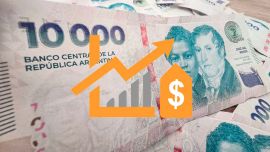The worst drought in nearly a century to hit two key regions in Brazil is wreaking havoc on hydroelectric dams and crops – and threatening the nascent pandemic recovery of Latin America's biggest economy.
Months of sparse rain have shrunk rivers, left their banks cracked and parched, and reduced normally sprawling reservoirs to webs of puddles across Brazil's southeast and central-west.
The dry spell in this large, economically crucial swathe of the country is hurting two important sectors: hydroelectric power, which Brazil depends on for nearly two-thirds of its electricity capacity, and agriculture, which has been driving its recovery from the economic rout brought by Covid-19 last year.
And there is no sign rain is coming: the southern hemisphere winter is typically dry in both regions.
Experts say the drought in the south is mainly caused by La Niña, the cyclical cooling of Pacific Ocean surface temperatures.
"We're facing a 'dry season' that in reality is going to last one-and-a-half to two years," said Pedro Luiz Cortes, a professor at the University of São Paulo's Institute for Energy and the Environment.
In the central-west, the drought is being driven by the destruction of the Amazon rainforest, experts say.
Deforestation has diminished the clouds generated by the Amazon, which dump precipitation across much of South America.
In central-western Brazil, the destruction has been causing rainfall shortages for nearly a decade.
That problem – part of the larger issue of climate change – risks turning "chronic," Cortes told AFP.
Inflation pressure
The drought is hitting output at Brazil's hydroelectric dams, most of which are located in the two regions.
Average water levels in the affected dams' reservoirs have fallen by 32 percent.
Last week, the National Water and Sanitation Agency (ANA) declared a "critical shortage of water resources," effective until November, for the Paraná river basin, the heart of Brazil's hydroelectric capacity.
The move allows the agency to temporarily change water rights regulations, though it said it did not expect to implement rationing for human consumption or irrigation "for the time being."
To boost their reserves, power plant operators would like regulators to relax requirements on how much water they must release through their dams.
But that would further lower river levels, affecting the transportation and agriculture sectors, which need the water to move boats and irrigate crops.
Keen to avoid a repeat of painful electricity rationing in 2001, President Jair Bolsonaro's government is seeking to source more electricity from thermal power plants.
But "even combined with other sources, such as the growing wind power sector, it would be difficult for thermal plants to make up for the shortfall from hydroelectric if energy consumption increases significantly with the economic recovery," Cortes said.
The timing could hardly be worse: Brazil's economy, which contracted a record 4.1 percent last year, had finally returned to its pre-pandemic level with stronger-than-expected growth of 1.2 percent in the first quarter of 2021.
Now, increasing electricity prices are fuelling inflation, which economists say could sap the recovery.
Brazil's annual inflation rate came in at 8.1 percent last month, far above the central bank's target range of 2.25 to 5.25 percent.
Adding to price pressure, the National Electric Energy Agency (ANEEL) has imposed an additional tax of 6.24 reais (US$1.25) per kilowatt hour on consumers for June because of water shortages at hydroelectric dams – its highest extraordinary surcharge ever.
"Industry has already been hit hard by rising input costs, and increased electricity prices just add an additional challenge," said economist Andre Braz of the Getúlio Vargas Foundation.
Agricultural threat
The drought is also hurting key farming states, at a time when the agricultural sector has been driving Brazil's economic recovery, with growth of 5.7 percent in the first quarter.
The country's sugar cane, coffee, orange, corn and soy crops are all under threat, driving prices higher.
Through-costs for animal feed will also push up prices for poultry and pork, said Vargas.
As if the fallout of the drought weren't enough, epidemiologists warn Brazil may also be facing a brutal new surge of Covid-19.
"The economic recovery could be really affected," said Sergio Vale, chief economist at MB Associados.
related news
by Morgann Jezequel, AFP





















Comments